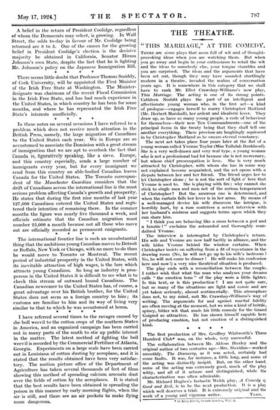THE THEATRE.
"THIS MARRIAGE," AT THE COMEDY.
THERE are some plays that seem full of wit and of thought- provoking ideas when you are watching them. But when you go away and begin in your enthusiasm to retail the wit and the ideas to somebody else, your tongue stumbles and you are surprised. The ideas and the arguments that have been set out, though they may have sounded startlingly modern in a theatre, invaded the realms of conversation years ago. It is somewhere in this category that we shall have to rank Mr. Eliot Crawshay-Williams's new play, This Marriage. The acting is one of its strong points. Cathleen Nesbitt plays the part of an intelligent and affectionate young woman who, in the first act—a kind of prologue—engages herself to marry Christopher Maitland (Mr. Herbert Marshall), her ardent and idealistic lover. They draw up, as have so many young people, a code of behaviour for themselves—their new Ten Commandments—one of the principal items in the treaty being that they shall tell one another everything. These provisos are laughingly aquiesced in by Christopher Maitland as he swears eternal constancy.
The next act takes place four years later at the flat of a young woman called Yvonne Taylor (Miss Tallulah Bankhead). She is a very well-drawn and very real type, a young woman who is not a professional bad lot because she is not mercenary, but whose chief preoccupation is love. She is very much attracted by Christopher, with whom she has in some way not explained become acquainted, and the act opens with a dispute between her and her friend. The friend urges her to let Christopher alone ; he is not the sort of light o' love that Yvonne is used to. She is playing with fire ; why cannot she stick to single men and men not of the serious temperament of Christopher? But the amorous one is determined, and when the curtain falls her lover is in her arms. By means of a well-managed device his wife discovers the intrigue, is horribly hurt, by a ruse contrives a secret interview with her husband's mistress and suggests terms upon which they can share him.
" I think you are behaving like a cross between a god and a lunatic I " exclaims the astounded and thoroughly scan- dalized Yvonne.
The interview is interrupted by Christopher's return. His wife and Yvonne are now half tacitly in alliance, and the wife hides Yvonne behind the window curtains. When Christopher insists on suffering from a fit of repentance in the drawing room (No, he will not go up to his wife's bedroom No, he will not come to dinner He will make his confession here and now !) a very nice theatrical situation is produced.
The play ends with a reconciliation between the couple. I rather wish that what the man who analyses your dreams calls " the emotion tone " of the play were a little lighter. Is this text, or is this production ? I am not quite sure, but so many of the situations are light and comic and are yet taken seriously, almost sentimentally. This atmosphere does not, to my mind, suit Mr. Crawshay-Williams's way of writing. The arguments for and against marital fidelity are often moving at the moment, but we miss a kind of brittle, spiney, bitter wit that made his little comedy for the Grand Guignol so attractive. He has shown himself capable here of producing emotion, but not emotion of a distinguished kind. * * * *


















































 Previous page
Previous page